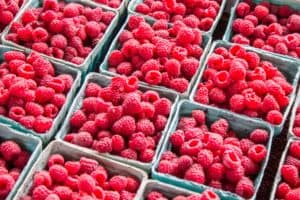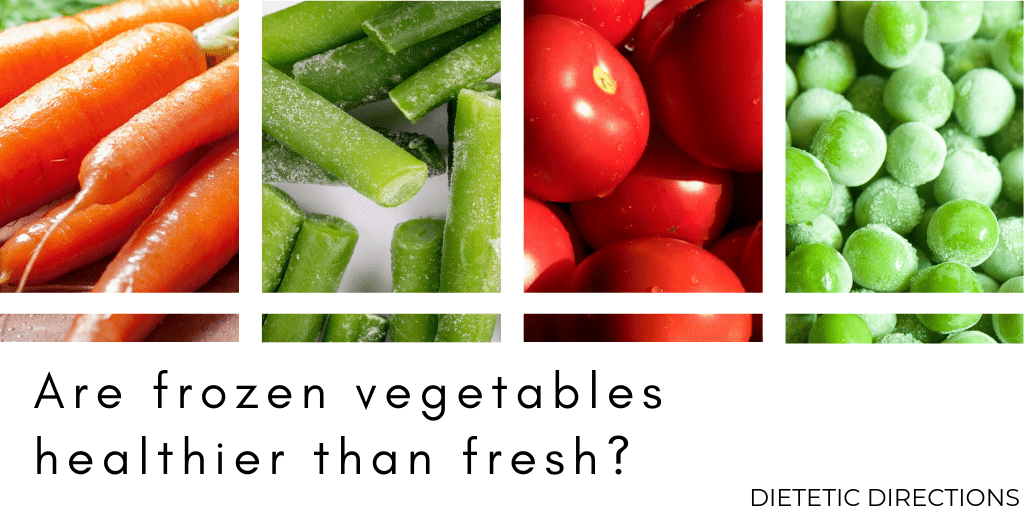
Are Frozen Vegetables as Healthy as Fresh?
With a plethora of food options, how do we know what to choose? It’s common to wonder if a certain type of food is better than the next. In fact, an extremely typical inquiry is: Are frozen vegetables as healthy as fresh? Today, we’ll answer that question with a resounding yes and highlight in detail what we need to consider.
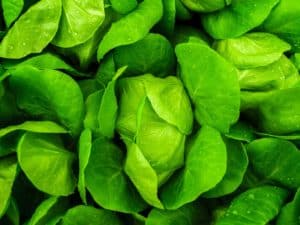
First, let’s start by breaking down how most people do with meeting recommended vegetable intake. According to Statistics Canada, only 30% of Canadians report consuming fruits and vegetables five times or more daily. You would have to aim for approximately two servings of veggies at both lunch and dinner to meet basic recommendations.

If you’re not hitting your fruit and veggie targets (like most) click here for my Top 7 Tips to Boost Veggie Intake! Additionally, including a serving of fruit with breakfast, for snack and as a salad or yogurt topper are good ways to incorporate more fruit into your diet.
DYK: One serving of veggies qualifies as about ½ cup raw or cooked veg or 1 cup of leafy greens. A fruit serving is usually about ½ cup or a medium sized apple or half large banana.
Now read on for how frozen veggies and fruit can help meet your nutrition needs.
5 Reasons to Buy Frozen Vegetables
1. They’re Just as Nutritious
Don’t worry that by opting for frozen veggies instead of fresh, you’re losing nutrition. Freezing does NOT decrease the number of vitamins or minerals in a vegetable. In fact, frozen vegetables and fruit can sometimes be more nutritious than fresh. Why? Frozen fruits and vegetables are picked at peak freshness and flash frozen before travelling to grocery store or market. Flash freezing freezes in all those good vitamins and minerals before they start to degrade over time.
Consuming frozen vegetables is another avenue to boost your veggie intake. There are numerous health benefits associated with vegetable consumption, like reducing the risk of heart disease, helping with weight management and preventing development of certain types of cancer.
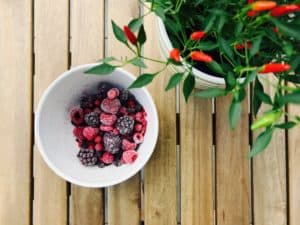
2. They’re Convenient!
Frozen fruits and vegetables are a convenient addition to meals. Adding them to meals helps boost intake. Similarly, they require no prep and minimal time to heat and enjoy.
Try adding frozen peas to stir-fry’s or risotto or add frozen peppers to pizzas and sauces. Additionally, by taking advantage of frozen fruit and veggies, you can reduce food waste because you have ready-to-eat options when you need them. You can also use only what you need for that meal.

Stock your freezer with your favourite fruit and veggies to add to meals. Frozen vegetables are pre-cut and pre-washed; therefore, ready to be added to your meals. I always keep frozen strawberries and cherries to add to oatmeal and frozen edamame for stir-fry’s and snacks. I also have chopped peppers and onions in my freezer for adding to sauces, wraps, tacos, chili, pizzas, etc. Additionally, I like to keep frozen broccoli to use in quiches.
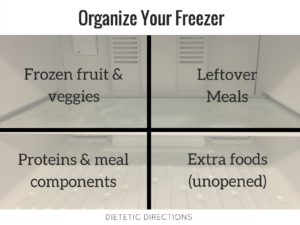
TIP: Click here if you are looking for meal inspiration to view my 15 Favourite Meal Themes.
3. Simple Ingredients
Fruits and veggies are not only a convenient meal addition, but they also contain minimal additives (if you choose the right ones). Choose vegetables and fruit that are frozen without any additional ingredients on the label. Aim to avoid veggies with added salt, fat or preservatives.
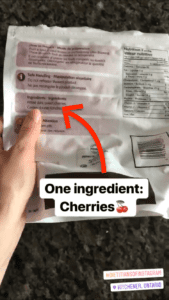
Via @dieteticdirections Instagram
Additionally, freeze your own fresh veggies and store for later. This helps reduce food waste if you do not have time to use them up. For example, before going away on vacation, I chopped carrots, celery and onions and put them into large freezer bags. When I returned home, I had these ready to add to meals like soups, sauces and a stir-fry.
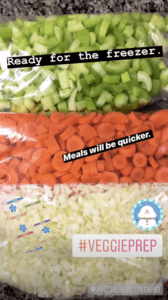
4. Cost-Effective
With rising food prices, choosing frozen fruits or veggies can save you tons of money. You can use the app Flipp and the search tool for frozen vegetables or fruit to find the lowest price. You can then price match at stores like FreshCo and Real Canadian Super Store.

Click here to read 7 Ways to Save on Groceries and Still Eat Healthy.
5. Enjoy Out-of-Season Produce
In Canada, we have an abundance of fresh produce available year-round. However, there are growing seasons in Ontario (see here for what’s in season). Therefore, by utilizing freezing as a preservation method, you can freeze local produce to enjoy later when it’s out-of-season. You can also save money instead of buying expensive imported, out-of-season food.
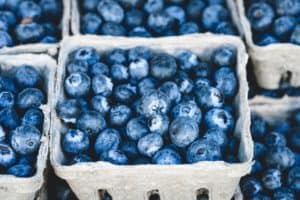
Dietitian Tip: Aim to choose locally grown foods in Ontario or Canada, when possible. Let’s support our amazing farmers to continue to produce safe, nutritious and affordable food.
How Long Do Frozen Vegetables Last?
Frozen fruit and vegetables last up to 8 to 10 months in the freezer. Keep the bag sealed tightly for maximum freshness. We also don’t want frosty or icy-looking produce. Be sure to take out what you need for cooking and put back into the freezer immediately to avoid thawing and re-freezing.
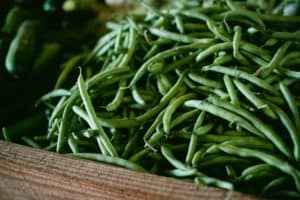
Bottom Line:
At the end of the day, frozen fruits and veggies are just as nutritious as fresh. Furthermore, most Canadians do not consume enough of them, in which case choosing frozen alternatives may boost consumption and help to decrease risk of heart disease, cancer and aid in weight management.
Take a freezer inventory and stock up on appealing and versatile options. Frozen produce consumption can boost nutrition, often with minimal added ingredients, and it is super convenient. Furthermore, frozen produce is cost-effective, and even allows us to enjoy out-of-season produce for a fraction of the cost.
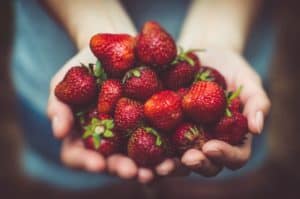
Now it’s your turn! Do you take advantage of frozen produce? How do you include them in your diet? Any favourites items and meal inspiration to share?
